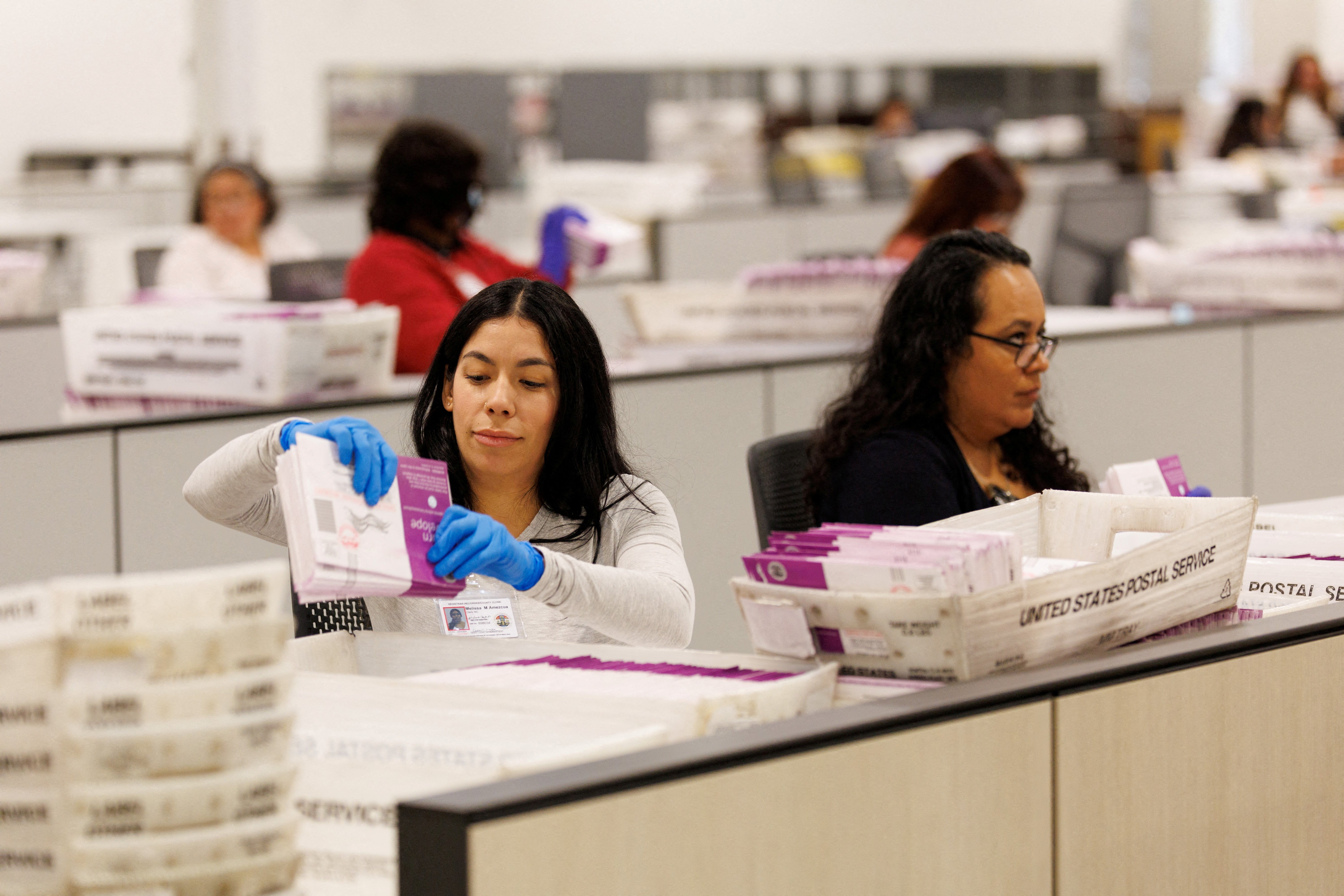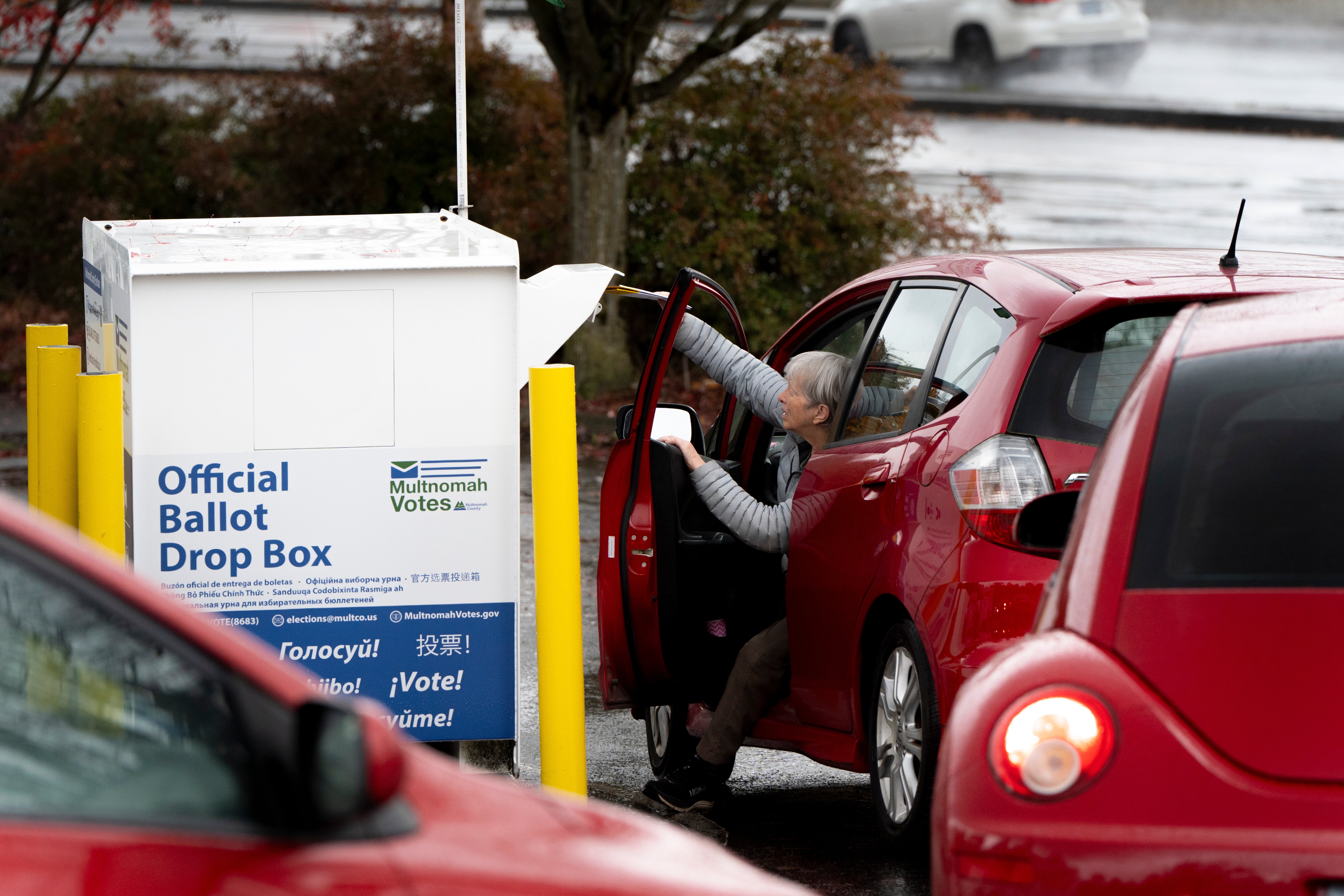Donald Trump’s blanket attempt to “get rid” of mail-in ballots could disenfranchise thousands of American troops inside and outside the United States, a threat that military veterans and advocacy groups have condemned as the president’s latest attack on service members.
On his Truth Social account Monday, Trump promised to “lead a movement” and sign an executive order that he claims would target the “completely disproven Mail-In SCAM.”
“We’re going to start with an executive order that's being written right now by the best lawyers in the country to end mail-in ballots because they’re corrupt,” Trump said in the Oval Office later that afternoon.
Nothing in Trump’s statements appeared remotely legal or constitutional but marked his administration’s latest attempts to restrict voting access and take federal control of election administration.
Nearly one-third of all ballots cast in 2024 elections were submitted by mail, according to the U.S. Election Assistance Commission. Roughly three-quarters of the 1.3 million active-duty troops are eligible to vote absentee, according to the Federal Voting Assistance Program.
If Trump tries to implement a total ban on mail-in and absentee ballots, thousands of overseas voters in the military — as well as disabled veterans and troops who cannot show up in person on Election Day — could be blocked from the ballot box.
“By attacking mail-in voting, he is attacking the men and women in uniform who are serving overseas to defend our right to vote, those on base away from their homes, and all of their families,” Marine veteran and VetVoice Foundation CEO Janessa Goldbeck told The Independent.
Troops stationed overseas “could soon lose their democratic voice because Donald Trump demanded it,” she said.
For more than a decade, Trump has repeatedly raised bogus claims about mail-in voting, lied about election results, and questioned how elections are run by raising unproven allegations of widespread voter fraud.
Trump has done so while casting ballots by mail himself and launching messaging campaigns encouraging his supporters to do the same.
His false, ongoing narrative that the 2020 election was “rigged” and “stolen” from him has fed conspiracy theories targeting the legitimacy of election outcomes and voting by mail.
In 2020, nearly half of Republicans believed that any eligible voter should be allowed to vote by mail if they want to, according to polling from the Pew Research Center. Four years later, only 28 percent of Republicans agreed with that.
In response to The Independent’s request for more information about Trump’s proposal, including whether U.S. troops and disabled voters would be exempt from threats to mail-in ballots, White House spokesperson Harrison Fields claimed Democrats — not the president — are responsible for undermining election outcomes.
“Democrats have eroded faith in our elections with reckless laws, such as unfettered mail-in voting, illegally changing laws to benefit their voters, and slow-walking the counting of votes far past Election Day,” Fields said.
Goldbeck pointed out that mail-in voting “should not be a partisan issue”.
“Mail-in voting is crucial in having elections that truly capture the voice of the people,” she added. “When we limit elections to only those who are physically able to travel to their correct polling location, we disenfranchise millions — including those who serve.”

Trump’s proposal would “strip away a vital lifeline for democratic participation from the very people who fought for this country’s freedoms,” according to Naveed A. Shah, Army veteran and political director of Common Defense, a progressive veterans’ advocacy group.
The move could also disenfranchise veterans and other American with disabilities, as well as “the elderly, individuals with disabilities, rural residents, and low-income families who face transportation challenges or health risks,” he told The Independent.
“Ultimately, what President Trump is proposing would lead to increased voter suppression, widening inequities, and undermining trust in our electoral process, which is a disservice to the servicemembers and veterans who have sacrificed so much for our democracy,” Shah added.
Trump issued an executive order earlier this year that called for dramatic changes to how elections are run, including directing the Pentagon to require military voters to prove citizenship to cast a ballot from overseas — additional hurdles that the Brennan Center for Justice at NYU Law called not just “impractical and impossible for many to meet, but shameful.”
Trump’s order also tried to block states from counting mail-in ballots that were postmarked by Election Day and arrived later.
A federal judge has temporarily blocked Trump’s order while a legal challenge is ongoing.
Voters who live overseas or serve in the military are largely protected by the Uniformed and Overseas Citizens Absentee Voting Act, which guarantees military members who are stationed abroad can still participate in elections.
Last year, Republicans filed a flurry of lawsuits in battleground states to target ballots cast by American voters living abroad — including military service members — by challenging the 40-year-old law.

Less than two months before Election Day, Trump raged without evidence that Democrats are “working so hard to get millions of votes from Americans living overseas.”
“Actually, they are getting ready to CHEAT!” he wrote.
Elon Musk also amplified baseless allegations of overseas voter fraud, including sharing a post on X claiming Democrats “plan to steal elections using ‘overseas’ ballots.”
Those lawsuits were tossed out of court, but Trump’s latest threats will likely trigger another wave of litigation.
Voting is nearly entirely conducted by mail in eight states, and there already exists a rigorous system of checks and balances, as well as prosecutorial power, to ensure that only eligible citizens are voting abroad. Voters overseas must meet the same identification and registration requirements as all other voters, including providing proof of a residential address in the U.S., under penalty of law, according to the Brennan Center.
Martha McDevitt-Pugh, International Chair of Democrats Abroad, said Trump’s latest proposal is “nothing more than an authoritarian attempt to seize control of our election systems, strip away one of the safest and most accessible ways to vote, and lay the groundwork for voter suppression in 2026.”
Mark Ritchie and Susan Dzieduszycka-Suinat with the U.S. Vote Foundation and its Overseas Vote program called Trump’s threat “unconstitutional, unprecedented, and an attack on the rights of millions of American voters, including our military and overseas citizens.”
Trump’s latest threat to mail-in voting also came just days after he claimed that Russian President Vladimir Putin told him that the 2020 election was “rigged” because of it.
“He said ‘your election was rigged because you have mail-in voting,’” Trump claimed to Fox News host Sean Hannity last week. “He said, ‘mail in voting, every election — no country has mail-in voting. It's impossible to have mail-in voting and have honest elections.’ And he said that to me … because we talked about 2020. He said, ‘you won that election by so much.’”
Trump appearing to take the advice of "authoritarian leaders abroad” is “not only misguided but dangerous,” Ritchie and Dzieduszycka-Suinat said. “The administration’s threats serve only as a distraction from other failings and do not deserve serious consideration.”
Trump says he will sign executive order and lead ‘movement’ against mail-in voting
Lawmakers are fighting over election maps — here’s how it works and why it’s bigger than Texas
Four Democrats join Republicans to pass SAVE Act bill that requires proof of citizenship to vote
DOJ investigating DC police after Trump alleges ‘fake’ crime data
UK preparing to send troops to Ukraine if peace deal is struck
Trump-Zelensky meeting live: Trump won’t send US troops to Ukraine







